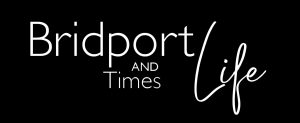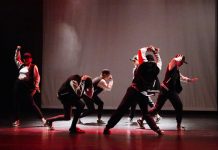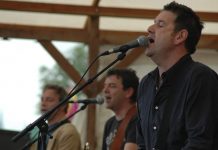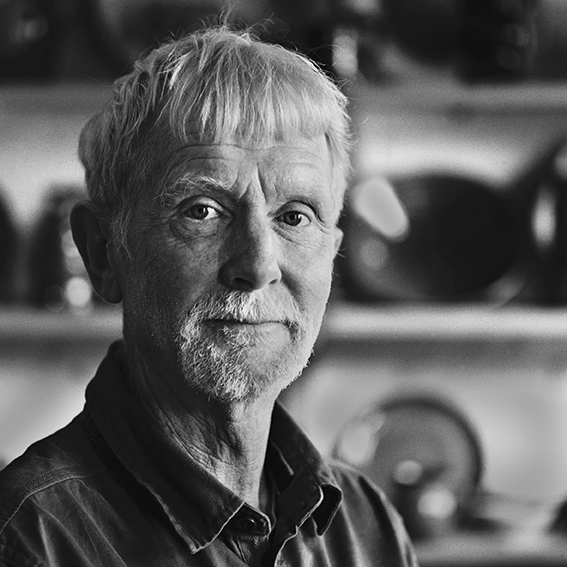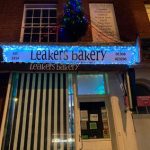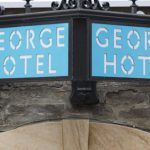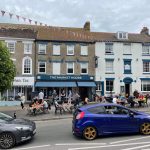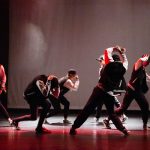‘I was born in Wimbledon, in 1948, so I was a suburban child. My upbringing was very conventional; I went to a minor public school, and left it with no clear idea of what I wanted to do, as long as it was something to do with the arts side of things because that was what I’d concentrated on, and enjoyed, at school. I think my parents were fairly desperate to get me into “the professions”. My father had a very difficult working life: he was in the RAF during the war, then worked in the motor trade, in various management positions, and was made redundant several times. Because of this, they hoped a professional career would give me the security so lacking in their lives. So they put my interest in art and buildings together and came up with architecture – the perfect solution – so that’s what I did.
I thought that’d probably be ok, perhaps for lack of a better idea, and off I went to Hammersmith College of Building and Art, which was a fairly low-key way into the profession, and at the same time was assigned to an architectural practice as a trainee. I did that for about 5 years, in the 1960’s. However, with everything that was happening in London at that time with architecture, I grew very dissatisfied with the profession. As someone aged about 20 I was supposed to go on site and tell experienced craftsmen what to do, which was pretty difficult as obviously I had neither their experience nor skills. I had other architecture student friends, one in particular from Cambridge University, who felt the same disillusion, and who didn’t want to go along with the conventions of the profession. It was 1968/69, a time when there really was a whiff of revolution in the air; we were getting involved with the politics of it all, and the horrors of tower-block building in London were at their peak.
Eventually I gave up my job, and gave up my course with about two years to go. I just couldn’t see myself in that life. The practice I was assigned to wasn’t a bad job, the people were nice to work with, but mostly we were doing up posh houses for posh people and it just didn’t seem relevant to me. There was quite a lot of social unrest going on, and inappropriate development was leading to the break-up of communities, especially in the East End of London, so that was why I left.
It just happened that at the same time as I gave up my job, in September 1970, one of my architectural student friends was coming down to Dorset, to a place called Pilsdon, to do a small building job, and invited me to join them. So I landed up at Pilsdon community, which for me was a completely extraordinary experience. I was there for two months, and then returned to London, to Hackney, and tried living in a commune there, almost an obligatory thing to do at that time. Mostly what I learned from that experience, was how hard it is to live in a community with some kind of common ideals going on, and perhaps inevitably the commune collapsed. Then I went with a friend to live in another commune in West Chinnock, near Crewkerne, but that one collapsed as well and I found myself with not much to do and nowhere to live. So, in 1972 I went back to the Pilsdon community. I didn’t go there with the idea of joining the community, but Percy Smith, who was in charge there at the time, suggested I should, so I agreed. I lived there for the next 5 years, and it was a most wonderful time.
I left Pilsdon in 1977 to live in Bettiscombe with a girlfriend for the next 3 years, after which I returned to Pilsdon to assist in the change of leadership. Unfortunately there were differences between some of the community members and the new warden who’d replaced Percy Smith, so a group of us left. While I had been there however, I’d been learning pottery. At school I’d wanted to do pottery, but because I did art I wasn’t allowed to do craft; one of those school curricular absurdities. After picking up the basics of pottery at Pilsdon, I was making pots as a sideline, but the building work earned the cash to support myself. In 1982, I got married, and we had two boys who of course are now well grown up, but I’m afraid the marriage didn’t last. Then I got married again, fairly soon after the first marriage, and we had a daughter together. Added to the daughter my second wife already had, I now had four children from two marriages to try and support, so I had to keep pretty busy at the building work to make a living, although I didn’t enjoy the work all that much. However, it was reasonably successful, we managed to move up the housing ladder a bit, and we were living in Bridport, using the garage as a pottery. The pottery has followed me all over West Dorset, in various sheds and garages, wherever I’ve been living.
My second marriage broke up in 2002, but very soon after that, I was given the opportunity to buy Symondsbury Pottery, lock stock and barrel. Andy Lloyd, who had it before me, had decided to give it up. He was selling off various bits and pieces of equipment, and when I responded to his advert in the paper, he said “why don’t you buy the whole lot?”, so rather to my surprise, I agreed. I think it was one of those life-changing opportunities you sort of blunder into, and I’m very glad I did because I’ve been here ever since. There’s four of us who work here as potters, and it’s going really well. I’ve been living here in Symondsbury now for 18 months, just across the road from the pottery, in an estate cottage that I did up for myself. It’s a glorious place to live and work, and these days I only seem to need to go and do a small amount of outside work to make ends meet.
I sing in the Broadoak Choir; in fact all four of us potters belong. It’s a local singing group run by Chris Reynolds, a musician, composer, and fellow potter. At the moment we’re getting ready for a concert at Pilsdon. We’re not a church choir, but we do sing in churches, and we also perform at weddings, harvest suppers and other jolly events. I’ve also been very involved with theatre in Bridport for many years. First it was acting, and nowadays it’s directing the Encore Theatre, an amateur company but very, very talented. We try and do every type of theatre repertoire as long as it’s the best of its type, and perform in Bridport Arts Centre. For example we’ve done “Noises Off” by Michael Frayn, which I think is the most brilliant farce ever written. Quite differently, we’ve done “The Crucible”, by Arthur Miller, twice now. I thought it was time to put it on again a couple of years ago, when George Bush was in the White House, saying things like “if you’re not with me you’re against me”, which is a direct quote from the play except of course he’d misunderstood it. We won some awards with that play; there’s another farce in the pipeline for next autumn.
So it’s been a busy life, quite stimulating, and it’s had its ups and downs. I don’t mind stress; I actually think it helps things along, although nowadays I’m trying to restrict myself to being involved with one project at time as I’m getting older, trying to do bit less but enjoy life more.’

